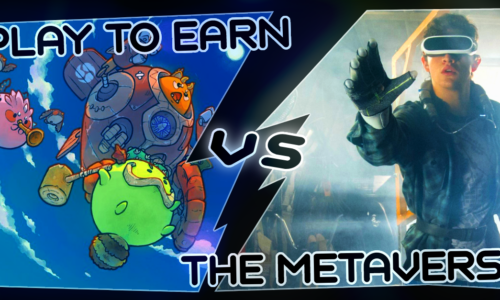This is an opinion piece. After researching and indulging myself in the space for some months, these opinions reflect my current thinking about this space that evolves at a rate that should keep us all up at night (but luckily it does not). I want to take a moment to reflect. This space is super interesting and has such tremendous potential that it’s insulting to not start thinking about it.
The Play to Earn Trend
Play to Earn is a framing of parts of the crypto-game-space that has helped propel crypto-games into a more public light than ever. Crypto games are relevant because they are among the most promising experiments towards our digital future – the metaverse. But also, great short-term earning potential is waiting for those who crack the nut of accessibility and providing true value.
The story around games like Axie Infinity is inspiring and goes on, as it is growing daily. Games, enabling people to pull themselves up by their bootstraps through gaming? Isn’t this a great promise of the blockchain and crypto, the power going back to the people? And all of that is happening in games, a medium we understand!
In this article, I want to explore and theorize the future and the short-term outlook of Play to Earn Games, their potential to become the next big mass-market innovation, and their potential to be a stepping stone towards a metaverse.
Users go to where they see value
People, therefore gamers, are no fools. They will move with their attention and money, where their need for playing and entertainment is satisfied the most. Therefore, the games industry has to find ways to create gameplay value and experiences that are better, different, or that lower the entry barrier.
Better was what developed markets in the 1990 – 2010s, with AAA productions competing on quality and scope. In the 2010’s, the competition for different started. Where indie games tapped into “niches” that gave players more specific need fulfillment that fit their individual taste much more accurately.
Then in the late 2010s and now, we are expanding the space by lowering entry barriers to reach more and more players, and by innovating business models (Free to Play).
But also, we can observe a declining rate of growth, which is certainly concerning and incentivizes us as an industry to look at the next haven. What is the next unfilled need in gamers that is worth capitalizing on, on a large scale?
Is Play to Earn the Next Thing that the industry is yearning for?
My key point throughout this article is that Play to Earn is not fulfilling the needs of players in any better way than existing games do. The way in which it is different certainly speaks to some players, but I think the “flavor of different” asks players to compromise on their core needs. And the barrier of entry is certainly not lowered. I think it is very unlikely it would “overtake” gaming, or replace existing business models.
There is some unique value in Play to Earn games which holds a place for them in the future gaming market. This space is certainly larger than it is now, but the limits of it might still be more narrow than we think.
Why do I believe this?
Play to Earn actually cannot exist
In the traditional definitions of “Play“, Play cannot occur if a player is motivated to engage in playing primarily through extrinsic means, such as thinking about the real value of their assets, or how to make more money through interaction with a game. “Real Value” breaks the magic circle that players enter when playing a game. The magic circle emerges just because: what happens inside, stays here. We can compete, but still be friends afterward; we can fail, but our real safety is not harmed. We win, lose, and have an otherwise impossible emotional rollercoaster. This emerges through interactions of this shared, fictitious place. This is not just a scholarly exercise around definitions. It actually highlights the intrinsic problem of P2E Games:
If a players’ goal becomes to earn, all of these constraints vanish, and the game experience becomes entangled with real-life consequences.
This problem reveals the core challenge for crypto-games to overcome. How can we play with things whose value reaches beyond the playspace that we are in?
Pretend case-study: Eve Online

Eve online is a game that features a player driven economy where the value of items is created through gameplay, and trading of items between players is the way to progress and participate in most of the games’ systems. Making it the staple of MMOs for a long time now. I’d love to see a game like Eve but in a crypto space, where players could have even more power over their own experience. The “true” economy of Eve online makes it feel like we’re already at the cusp of a crypto game. Players have ways to purchase soft currency (that drives almost everything) in Eve. But this only works in one direction. ISK (the currency in Eve Online) is “Play Money”. It loses its real world utility; I have made my investment, I have valued the experience that I anticipate by buying ISK. As I don’t expect a return, I am free to play with that currency. It keeps its emotional value because I paid for it. Therefore, I want to spend it wisely. To make the best use of it, and to achieve things in-game. There even is a soft version of “Earning” in Eve: Players can convert soft currency to hard currency and pay for their subscription. These 12$/ month is what players can “earn”.
Let us break the game. Let’s allow to cash out hard currency to real money. My motivation, my incentive to play would immidiately change. Losing a ship in Eve is like losing real money, my willingness to spend on things is reduced because of a fear of loss. Other actors enter the market, that don’t adhere to the implicit rules of the game that have been established to play, but they introduce new dynamics into the game because they have other motivations. Behaviors that we were previously motivated by, like competing for mutual, exclusive space and resources in a shared universe, are now incentivized by earning money.
This would be an entirely different product from the game that players were initially hooked to, speaking to a very different core audience. Sure, there might be some overlap but the players who came for the “non p2e” game will leave. This, at scale, means that (in their current concept), P2E games speak to a fundamentally different audience than “play for fun” games.
The point here is, labeling games as play to earn can lead to false assumptions about the potential of these games and the audience. The future will show which users will stick, but for now here are some hyperbolic proposals of what P2E actually is:
Work to Earn: If it puts food on your table, you are not playing anymore. You are trying to maximize the real-world value of virtual assets through a game system that you invest time into.
Invest to Earn: If you invest money, you’re hoping that others do the same. To increase the nominal value of items, so you can sell your NFT’s at a profit. Then the fact that there is a game system at its core, does not change that you are an investor more than a player. In P2E games you can even specialize in just being an investor, letting others work for you.
A wolf in sheep clothing
Play to Earn is almost like a cheap trick. We use the systems we know, apply a very strong, already existing real world incentive. Then we look at engagement numbers and forget that we have lost the very thing along the way that we are building upon: The Game. The Fun. The Play.
I don’t think this a problem per se, but it should be marketed and perceived as such. We just have to be aware what we are doing as an industry. We cannot apply established assumptions, the economics, or audience definitions to this segment of games. It will behave and evolve in its own right, running on a totally different “fuel” than the games industry as we know it.
This inherent “glass ceiling” of market potential, could create some long term ripple effects. Don’t get me wrong. Any change brings potential downsides. We can always find these when we look for them. Downsides in itself is not a reason per see to not embrace the change. However, considering the downside to be able to mitigate, embrace, and steer a potential change is an essential tool. Having said this, my proposed downsides could be a) wrong, b) not as impactful as I think, and c) incomplete:
An opportunity cost right now
Focusing too much on the short term gains of P2E creates a bubble. Whatever this “bubbled” investment is, could create more value down the line if invested in more sustainable models/ experiments.
Hurting Future Investments
A bursting bubble that normalizes the market reality, leaves “burnt ground”, which can harm future investments into other, viable, paths towards innovation.
Any Investment into the space = progress
Play to Earn, although not adding (play) value for most players, still helps drive the narrative and hype around crypto games.
Blockchain is still so unexplored in its opportunities, that any effort spent (money, products, people trying out things), has good chances of yielding learnings; surfacing behaviors and motivations that could not be explored so far. In that vein, Play 2 Earn creates value on a large scale. It will be one of many tales of how we became (some version) of a digital species. Blockchain is still an emerging technology with its true value revealing itself gradually. But the path to its full potential is unclear. Any stab into the blockchain & crypto game space is worthwhile. A majority of the current attempts will fail, but that is a learning cost on a large scale, with the return being even larger eventually.
Many games in the current space can rather be described as “NFTs + Gamification” than “Games on a Blockchain”. But that’s ok. Because it will be a stepping stone towards true crypto games. As such, we are fortunate that we have the attention and the money in this space to run these quite expensive experiments and learn. The current crypto games, including P2E, are a playground that is rich in opportunities.
The Flipside of the hype
However, there is a huge grain of salt in the narrative pull effect that P2E can create to propel crypto games: the more the public narrative around crypto games will be that of “jobs”, or investments, the harder it could become to outgrow this early stage. Especially possible angles pointing towards gambling is what makes it easy for regulations to be applied that can slow down the progress.
Part 2 – What are alternative paths for Cryptogames beside P2E
P2E might be a branch that does not lead to a metaverse, but mechanics and game systems that run on the blockchain are.
So what are the actual capabilities, where is a “more true” potential of added value that crypto games could bring to players?
The potential USP of blockchain for players resides in empowering players to create their own world through their actions, contributions, and finding a way to measure value. The rules of this world are governed by the players, where each game could be its own DAO. Games can be built entirely on top of smart contracts that players themselves can extend to build their own smart contracts (a.k.a. mechanics) and hook it up with their own NFTs (a.k.a. content). In the end, it will mean that the power shifts away from designers and developers. As their control of the rules of the world and its content is diminished, players take over. Business models have to be designed to run these platforms, but content and mechanics are created by players for players. There will still be a place for AAA content, players always crave high-quality content that will continue to be crafted by artists and experienced crafts people, but the distribution would change drastically.
Business incentives are the cure, but could also be the disease
The framing of crypto games as Play to Earn, and the promise of ownership, (in all of its fuzziness) creates short term incentives for platforms and publishers in the traditional game space to add new verticals: create a platform that retains added value (playtime, money) in the ecosystem through NFTs or currencies. Thus, locking in players more in their ecosystems. There are certainly millions (billions?) to be made, by giving players ownership of their assets. Figuring out ways to enrich these items with cross-game but intra-platform value will be the money maker here. I think this not just a dead end, but also another potential blocker in the progress.
What will the new business models solve?
A business model that wants to make P2E work, but also any other crypto-game has to solve the fundamental challenge of value vs. utility. If a game uses currencies that have utility outside of the game, it is not a game anymore. We need systems that enable “Play”, but we also want ownership and freedom of choice and value not to be locked in one ecosystem.
The challenge(s) of the businessmodels to come
But then, how does a game safeguard itself when we basically have “gamer value” translate to other games? If the time spent in 1 game translates to a new game, that transferral “effort” should not skip content or systems right? Otherwise, what is the point of starting the game? So the new game needs some sort of reset? I am digressing. This is going to be the design challenge for the next 1-2 years for some of us. I am very excited to see how we solve this, if at all. Either we find a genius way to make it work on a macro scale, or it turns out to be an eternal design problem that can only be solved within very specific ecosystems and games.
Any world that humans inhabit is a world that will have an emergent need for escapism. Even if that world is the metaverse to which we escape.
Escapism is only escapism if all ties are cut. This is why Play to Earn is flawed.
What happens to F2P? What happens to Premium?
As I have laid out, P2E fills a gap that is not competing much with other existing models. Like the motivations to engage, the need these products fulfill is a very different one than “traditional games”.
Some say, P2E is a better version of F2P but, as I laid out, this cannot be true. We can use Free to Play mechanics to hook players and transition them into a P2E economy. But eventually, even a P2E economy has to generate money somewhere. Whatever some players earn is a share of what all players, or some players, spend. This “trickle down” effect necessitates very specific economies which narrows down “possible” games that can exist in this space. Traditional game experiences are so compelling, players will not make compromises, and there will always be a demand for encapsulated experiences.
The role of games in a metaverse
I don’t think that games themselves are going to be the one driver for a potential metaverse, they’re just one of many aspects that will turn out to be a building block. Gaming technology will probably be at the front, but “gaming” as such will take a back seat. It has to: the metaverse will capture the real human value that reaches far beyond “playing”. Similar to mobile applications providing all different kinds of value, one of which is entertainment. But games are a great laboratory to run experiments in which can teach us more about a decentralized future. As such, games will be at the forefront of our digital future; however, they’ll hand over the torch to everyone to truly give ownership to all people, not just gamers and early adopters.
The Big Question
The answer to the more philosophical question of whether humanity will evolve into a digital-first-species is what ultimately will set the ceiling for crypto games. Would there be a global adaption of a metaverse? Is it built on top of gaming technology, or are games a side branch of a metaverse?
As automation increases, value shifts from “traditional”, production-centered utility, towards experiential utility. This experiential “space” is large and reaches far beyond gaming. We cannot have true need fulfillment in a world that allows us to do anything. We require a world of rules. And I believe that we have an innate preference for the rules of the quantum space that we inhabit. Not the world merely wrapped in games systems. The metaverse that will win, is the one that comes closest to the world in which we biologically evolved. Thus, the question will be if the real world and our bodily existence in it, is not the best metaverse after all.
Conclusion
- Play to Earn taps into entirely different motivations and needs, Play to Earn games are Gamified Economies. This means we have to think of game-like-products that allow players to own their tradable crypto-assets fundamentally differently
- Play to Earn incentivizes the creation of business models and systems that could enable metaverse like game-economies
- These systems and models have to solve how games can monetize the players need for actual play without breaking the magic circle, but still have a feeling of full ownership
- The framing of crypto games as Play to Earn could be more harmful than we think, but also the investments into crypto games that the trend promotes help crypto games in general
- The world that we create to escape from our current world will also be one in which we want to escape. Therefore, Play to Earn will remain a fantasy that is inherently not what we actually want.








